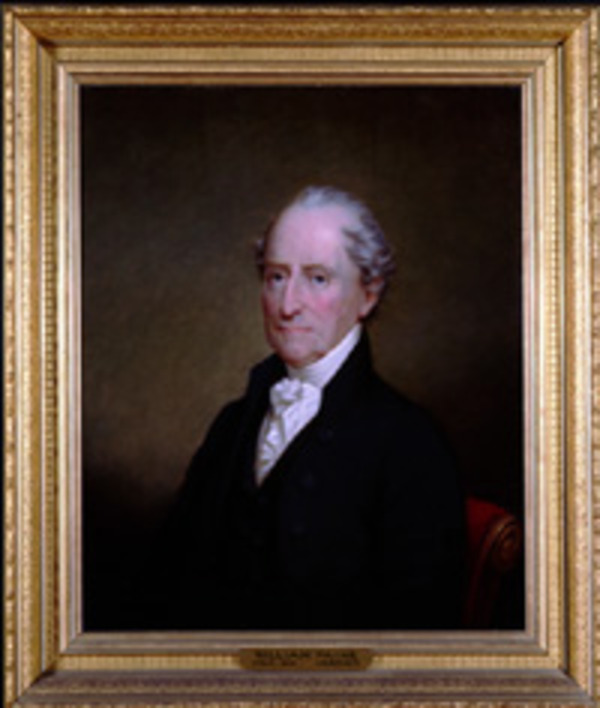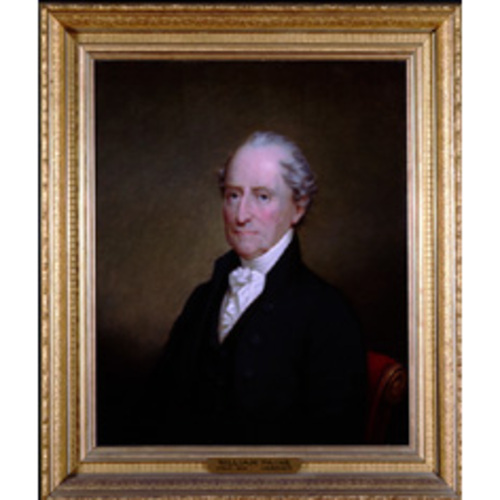
Source: Link
PAINE, WILLIAM, physician, office holder, and politician; b. 5 June 1750 in Worcester, Mass., son of Timothy Paine and Sarah Chandler; m. 23 Sept. 1773 Lois Orne of Salem, Mass., and they had six children; d. 19 April 1833 in Worcester.
Born into the prominent Paine–Chandler family, William Paine acquired his lifelong interest in the arts and sciences as a young man at Harvard College. After graduating in 1768, he took up the study of medicine with the eminent Dr Edward Augustus Holyoke of Salem, and in 1771 he began his practice in Worcester, where he later brought his bride.
Although Paine apparently remained aloof from pre-revolutionary political debate, in favour of his studies, he was led by increasing disturbances to sign a protest on 20 June 1774 “against all riotous, disorderly, and seditious practices,” especially against the “dark and pernicious proceedings” of the committees of correspondence. The town meeting rejected the protest and censured the signatories, forcing men such as Paine to make an unequivocal political stand, the determinant of which in his case lay more in the social and political position of his family, with its interest in maintaining the status quo, than in any ideological conviction. To avoid persecution, Paine sailed for England in 1774 to pursue medical studies, and in November 1775 he received an md from Marischal College in Aberdeen, Scotland. Subsequently, he served until 1781 as apothecary to the British forces in the Carolinas, Rhode Island, and New York. Commissioned a physician in 1782, he was shortly thereafter ordered to Halifax, N.S. The following year, with the conclusion of peace, he was placed on half pay. Since he had forfeited his personal estate in 1779, Paine and his family joined the stream of refugees seeking new homes in British North America.
More fortunate than the majority of exiles, Paine received substantial grants of land in the Passamaquoddy Bay area of New Brunswick, as well as his half pay, and was awarded by the loyalist claims commission £300 on his claim of £1,440. He settled with his wife and three small children on Letete (Fryes) Island, with the initial optimism typical of so many loyalists: “My lands are certainly well located. . . . The island will soon be a place of consequence, and ultimately the principal Port in British North America.” Within a year, however, he had moved to Saint John in search of greater opportunities. Entering political life immediately, he was appointed an alderman of the new city in 1785, elected to the first House of Assembly for Charlotte County that same year, and named clerk of the assembly in 1786; in 1785 he succeeded Benjamin Marston* in the salaried position of deputy to John Wentworth*, surveyor general of the king’s woods, a post he filled conscientiously.
In spite of his extensive landholdings and various sources of income, Paine felt increasingly frustrated in his new home: “I am almost discouraged, and find it absolutely impossible for me with all the Industry, & Œconomy I am master of, to live upon my half pay & profession.” He and his wife were also deeply concerned over the lack of educational opportunities for their children, which led him in 1785 to join others in petitioning Governor Thomas Carleton* for “an Academy or School of Liberal Arts and Sciences.” In 1787 Paine visited the United States in order to attend to financial affairs (unresolved since his pre-revolutionary days), and in spite of his avowed intentions to return to New Brunswick he remained in Massachusetts. He resettled his wife and children first in Salem, and then in the family home at Worcester in 1793. Besides achieving financial prosperity, he attained a position of distinction in the new republic: he became an honorary member of the Massachusetts Medical Society and a fellow of the American Academy of Arts and Sciences, received an honorary md from Harvard College, and was a founding member of the American Antiquarian Society, to name only the most prestigious of his connections. His assimilation into the United States was completed on 14 July 1812 when he became an American citizen. He died at the age of 82, on 19 April 1833.
Paine remains an intriguing loyalist figure because of his uncommon decision to return permanently to his native home, where he not only achieved social acceptance but acquired wealth, honour, and dignity as well. Although the reasons for such complete acceptance of a former renegade on the part of Paine’s neighbours, especially in a society that demanded outward consensus, remain largely conjectural, the most probable explanation lies in his own personality. His apparent lack of strong ideological bias, his academic nature, and his professional desirability all helped to ease his return to his original home.
William Paine’s papers are held by the American Antiquarian Soc. (Worcester, Mass.) and are available on microfilm at the UNBL. The major part of the collection consists of business and legal documents, and day-books concerning Paine’s farm in Worcester following his return there in 1787; however, there are also some letters and journals which reveal something of the man himself. Some of his correspondence was published as William Paine, “Letters of William Paine, 1769,” Mass. Hist. Soc., Proc. (Boston), 59 (1925–26): 422–24; he is also the author of An address to the members of the American Antiquarian Society, pronounced in King’s Chapel, Boston, on their third anniversary, October 12, 1815 (Worcester, 1815).
PANS, MG 1, 939–40. UNBL, MG H2. “Worcester town records,” Worcester Soc. of Antiquity, Coll. (Worcester), 5 (1883). Massachusetts Gazette, and the Boston Weekly News-Letter (Boston), 30 June 1774. Massachusetts Spy (Boston), 30 Sept. 1773. Commissioned officers in the medical services of the British army, 1660–1960, comp. Alfred Peterkin et al. (2v., London, 1968). Jones, Loyalists of Mass. Shipton, Sibley’s Harvard graduates. Stark, Loyalists of Mass. (1907). Worcester births, marriages, and deaths, comp. F. P. Rice (Worcester, 1894). Esther Clark Wright, The loyalists of New Brunswick (Fredericton, 1955; repr. Moncton, N.B., 1972, and Hantsport, N.S., 1981). G. E. Francis, Notes on the life and character of Dr. William Paine (Worcester, 1900). Lawrence, Judges of N.B. (Stockton and Raymond). MacNutt, New Brunswick. Louisa Dresser, “Worcester silversmiths and the examples of their work in the collections of the museum,” Worcester Art Museum, Annual (Worcester), 1 (1935–36): 49–57. J. W. Lawrence, “The medical men of St. John in its first half century,” N.B. Hist. Soc., Coll., 1 (1894–97), no.3: 273–305. W. S. MacNutt, “New England’s tory neighbors,” Colonial Soc. of Mass., Trans. (Boston), 43 (1956–63): 345–61. W. H. Siebert, “The exodus of the loyalists from Penobscot and the loyalist settlements at Passamaquoddy,” N.B. Hist. Soc., Coll., 3 (1907–14), no.9: 485–529. E. O. P. Sturgis, “A sketch of the children of Dr. William Paine,” Worcester Soc. of Antiquity, Proc. (Worcester), 20 (1904): 129–42. James Vroom, “Dr. William Paine,” Saint Croix Courier (St Stephen, N.B.), 29 June 1893: 1.
Cite This Article
Carol Anne Janzen, “PAINE, WILLIAM,” in Dictionary of Canadian Biography, vol. 6, University of Toronto/Université Laval, 2003–, accessed December 31, 2025, https://www.biographi.ca/en/bio/paine_william_6E.html.
The citation above shows the format for footnotes and endnotes according to the Chicago manual of style (16th edition). Information to be used in other citation formats:
| Permalink: | https://www.biographi.ca/en/bio/paine_william_6E.html |
| Author of Article: | Carol Anne Janzen |
| Title of Article: | PAINE, WILLIAM |
| Publication Name: | Dictionary of Canadian Biography, vol. 6 |
| Publisher: | University of Toronto/Université Laval |
| Year of publication: | 1987 |
| Year of revision: | 1987 |
| Access Date: | December 31, 2025 |



